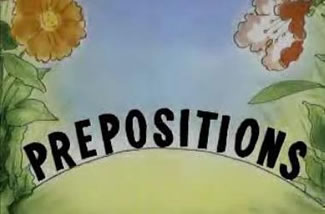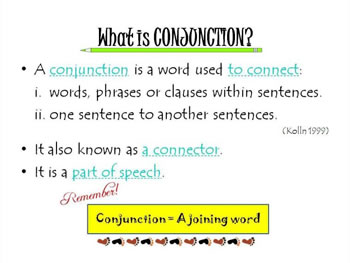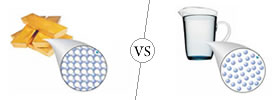Difference between Preposition and Conjunction
Key difference: Preposition is the part of speech that precedes a noun or a pronoun while expressing it in relation to the other parts of the clause. Conjunction is the connecting word that joins two clauses or sentences together.
 Prepositions are one of the eight parts of speech in the English grammar. Prepositions are used to define a noun or pronoun, in terms of direction, location, time, etc. Prepositions lend meaning and purpose to the nouns and pronouns. A preposition, as the name suggests, is mostly found preceding nouns and pronouns.
Prepositions are one of the eight parts of speech in the English grammar. Prepositions are used to define a noun or pronoun, in terms of direction, location, time, etc. Prepositions lend meaning and purpose to the nouns and pronouns. A preposition, as the name suggests, is mostly found preceding nouns and pronouns.
For example:
A car is being driven on the road.
The preposition used in this sentence is on, which is describing the location of the car. Similarly there are many prepositions in the English language that provide a noun or a pronoun, its place, location, time, etc., such as:
- A bird is on the tree.
- I am fond of music.
- The man was standing under the tree.
- He runs after money.
- I have to go to London to meet him.
 A conjunction is a word that is used to join together sentences, clauses, phrases, and even words. Conjunctions act as the connecting link between two entities and help to avoid obscurity, in terms of meaning of the text.
A conjunction is a word that is used to join together sentences, clauses, phrases, and even words. Conjunctions act as the connecting link between two entities and help to avoid obscurity, in terms of meaning of the text.
For example:
I didn’t attend school as I was unwell.
The word as is the conjunction used in the above sentence. It explains the reason why the person couldn’t attend his/her school. Some of the commonly used conjunctions in the English language are:
- Jack and Jill went up the hill.
- The water was warm, but I didn't go swimming.
- I went swimming although it was cold.
- Call the movers when you are ready.
- After she had learned to drive, Alice felt more independent.
Comparison between Preposition and Conjunction:
|
|
Preposition |
Conjunction |
|
Meaning |
Preposition is the part of speech that precedes a noun or a pronoun while expressing it in relation to the other parts of the clause. |
Conjunction is the connecting word that joins two clauses or sentences together. |
|
Commonly used prepositions/conjunctions |
On, in, for, from, it, etc. |
And, if, but, though, although, etc. |
|
Example of usage |
Your keys are on the table and socks are in the cupboard. |
Your keys are on the table and socks are in the cupboard. |
Image Courtesy: teaching.monster.com, englishexploration.wordpress.com









Comments
lusy
Sat, 01/30/2016 - 14:43
Add new comment